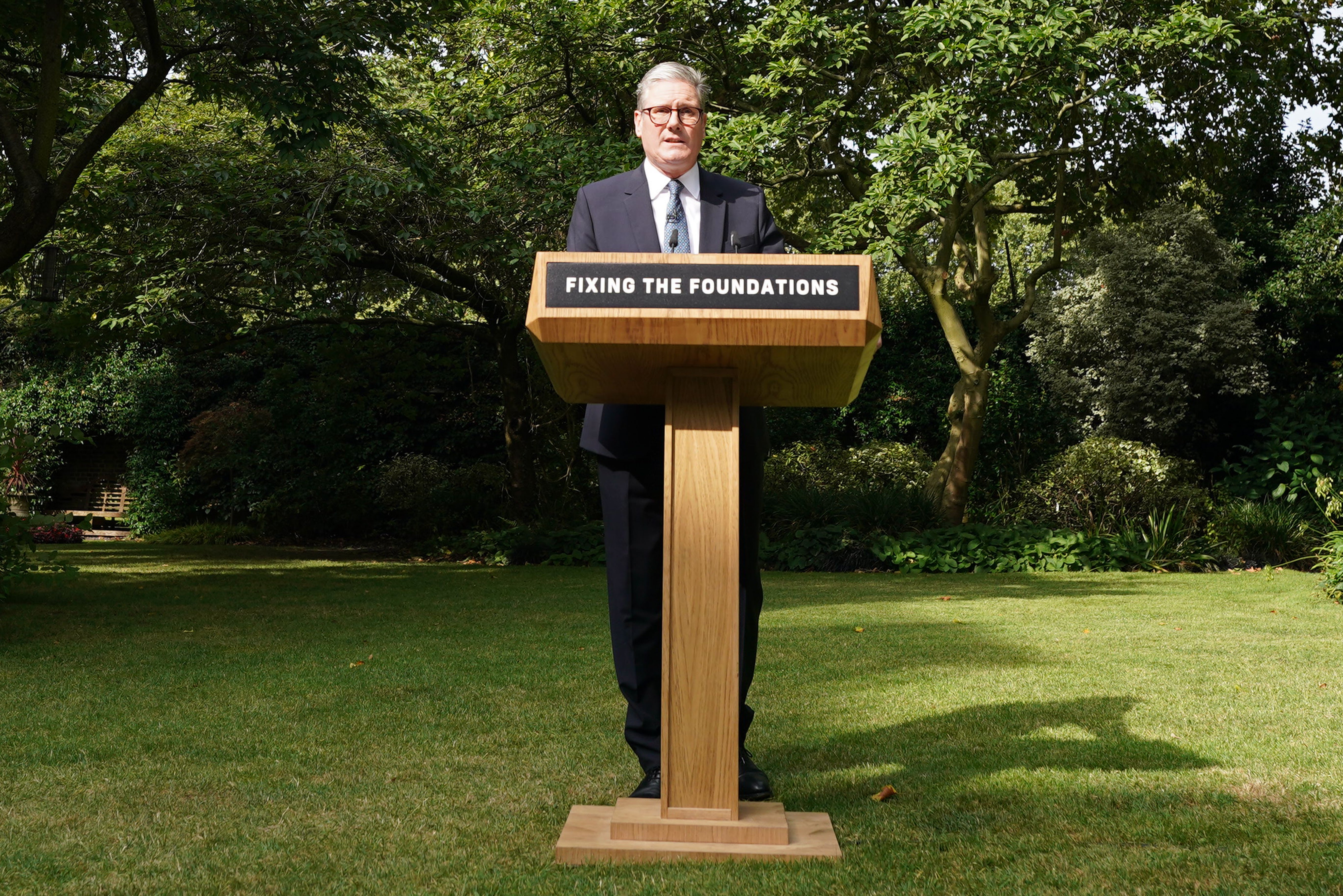The Independent's journalism is supported by our readers. When you purchase through links on our site, we may earn commission.
Oops! Has doomster Starmer realised he’s overdone the ‘things can only get worse’ mantra?
The prime minister dropped the phrase ‘rubble and ruin’ from his speech and tried to emphasise the things he is doing to fix the problems, writes John Rentoul – but will it work?


It looks as if Keir Starmer realised that he had overdone the doom and gloom in the weekend briefing about the Conservatives leaving the country in “rubble and ruin”. He dropped that phrase, which was in the pre-released extracts from his speech, when he actually delivered it in the Downing Street garden.
There were plenty of negative messages in the speech as he delivered it, though, including the “deep rot” that he inherited, meaning that he couldn’t “tinker or rely on quick fixes”, but would “have to overhaul the entire thing; tackle it at root”. Which would mean that “things will get worse before they get better”.
That is an unusually downbeat promise for a politician. At one point, in answering journalists’ questions, he compared the task ahead to doing up a house: it is no good just covering up the rot, he said, or it would come back worse. He sounded just like a builder, sucking his teeth and shaking his head at the cowboys who had done the work previously, saying it would cost a lot more to fix than you expected, and take a lot longer.
That is not what people want to hear. They do not want to be told how bad things are – they are well aware. That is why they voted to get the Conservatives out, after all. They want optimism and a believable account of how the new government is going to make things better.
It seemed as if someone around the prime minister realised that there might be a problem with the early draft of the speech, and tried to take out some of the more doom-laden bits while adding some more positive passages.
Unfortunately, the positive message was introduced with: “Between now and Christmas, we will carry on as we started. Action not words.”
The irony of proclaiming “action not words” in a speech shot past unnoticed. He then recited a familiar list from the election campaign of things that the government “will” do, at a stratospheric level of generality – planning reform, nationalising railways, levelling up workers’ rights, Great British Energy.
But then he was immediately back to demanding national sacrifice: “But I’ll also be honest with you. There’s a Budget coming in October, and it’s going to be painful. We have no other choice, given the situation we’re in.”
In other words, not only was his message negative and depressing, it was rather obviously designed to pave the way for tax rises in the Budget. This is risky: if the voters think Labour is pretending to be surprised by the poor state of the public finances in order to go back on the promise it appeared to make before the election not to raise taxes, there may be trouble ahead.
That is Starmer’s central problem. People understand that there are difficult choices and no easy answers, and they are prepared to be patient if they think there is a plan. So what the prime minister ought to have been doing was setting out the plan, instead of regurgitating election slogans.
Instead, he offered a complicated analogy with the recent riots, which he implied were caused by 14 years of divisive Tory government, and said his job was to clear up afterwards: “Just as when I responded to the riots, I’ll have to turn to the country and make big asks of you as well. To accept short-term pain for long-term good.”
That kind of appeal for collective sacrifice works only if a government has a credible and specific plan. Instead, all Starmer could offer was a platitudinous version of the sunlit uplands: “Imagine the pride we will feel as a nation when, after the hard work of clearing up the mess is done, we have a country that we have built together. Built to last.”
It would have been better, in retrospect, to have scrapped the speech and sent John Healey, the defence secretary, to make the announcement in the Downing Street garden that he was cancelling the previous government’s £40m helicopter contract.
I personally saw nothing wrong with Rishi Sunak’s helicopter rides, and it may be that, as one of Healey’s people told the press, they were a “symbol” of the previous government rather than the substance. But there are some symbolic gestures that people notice. That would be action as well as words, fixing something that people think was wrong about the previous government.
Instead, all that many people will take from Starmer’s speech was that taxes are going to go up when he said they wouldn’t and that things can only get worse.






Join our commenting forum
Join thought-provoking conversations, follow other Independent readers and see their replies
Comments